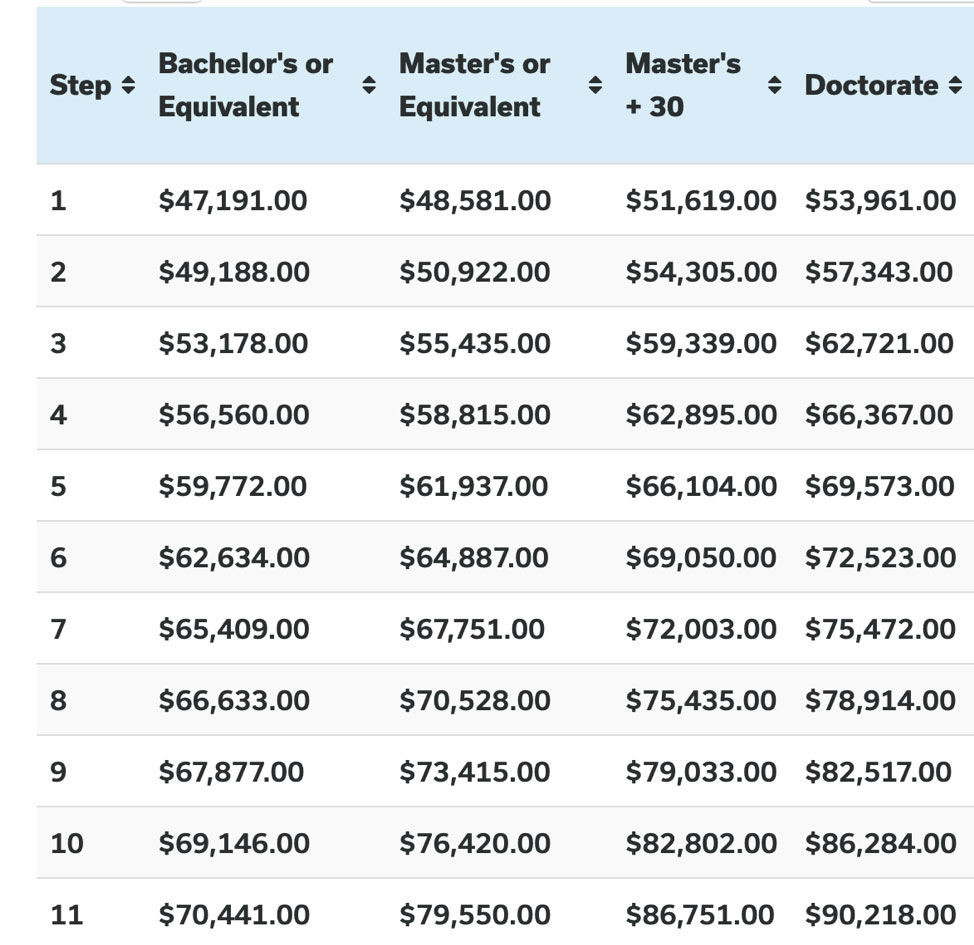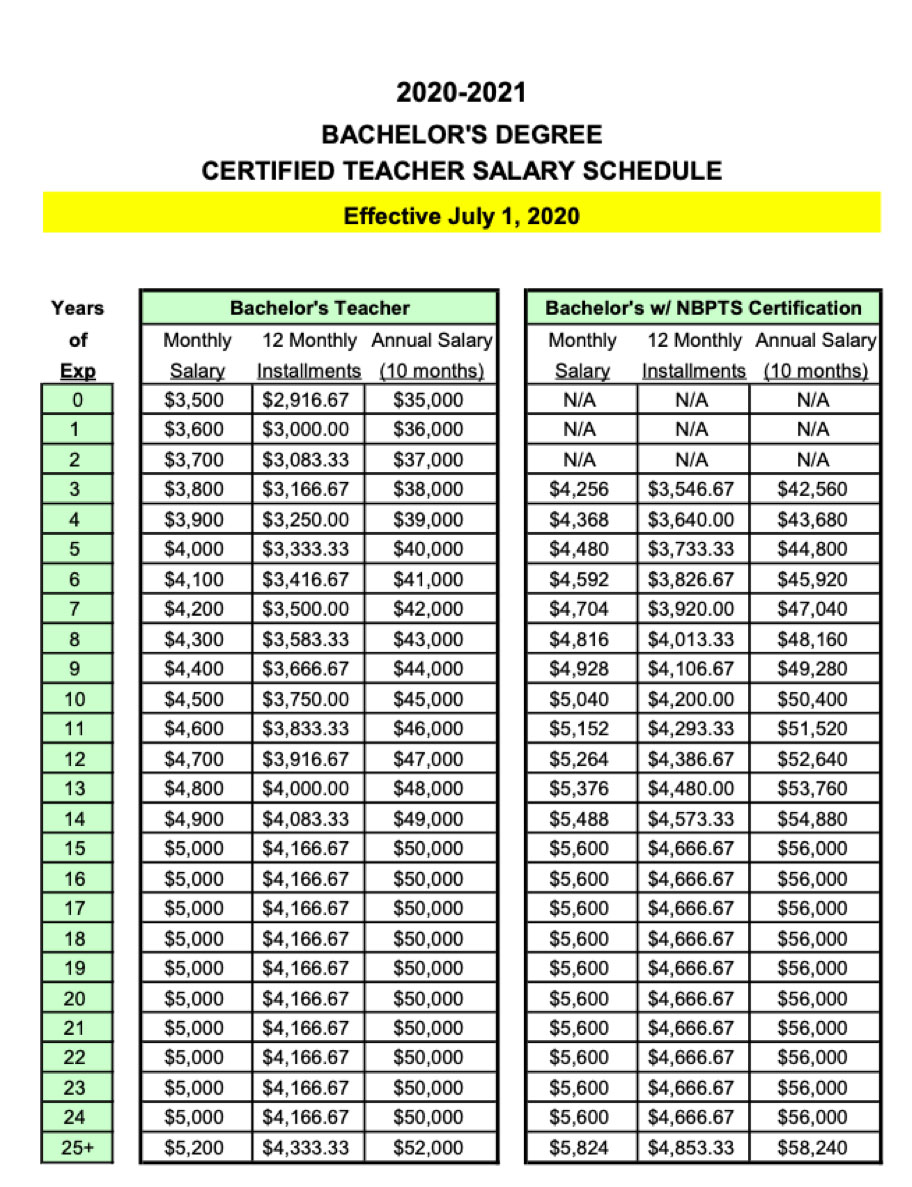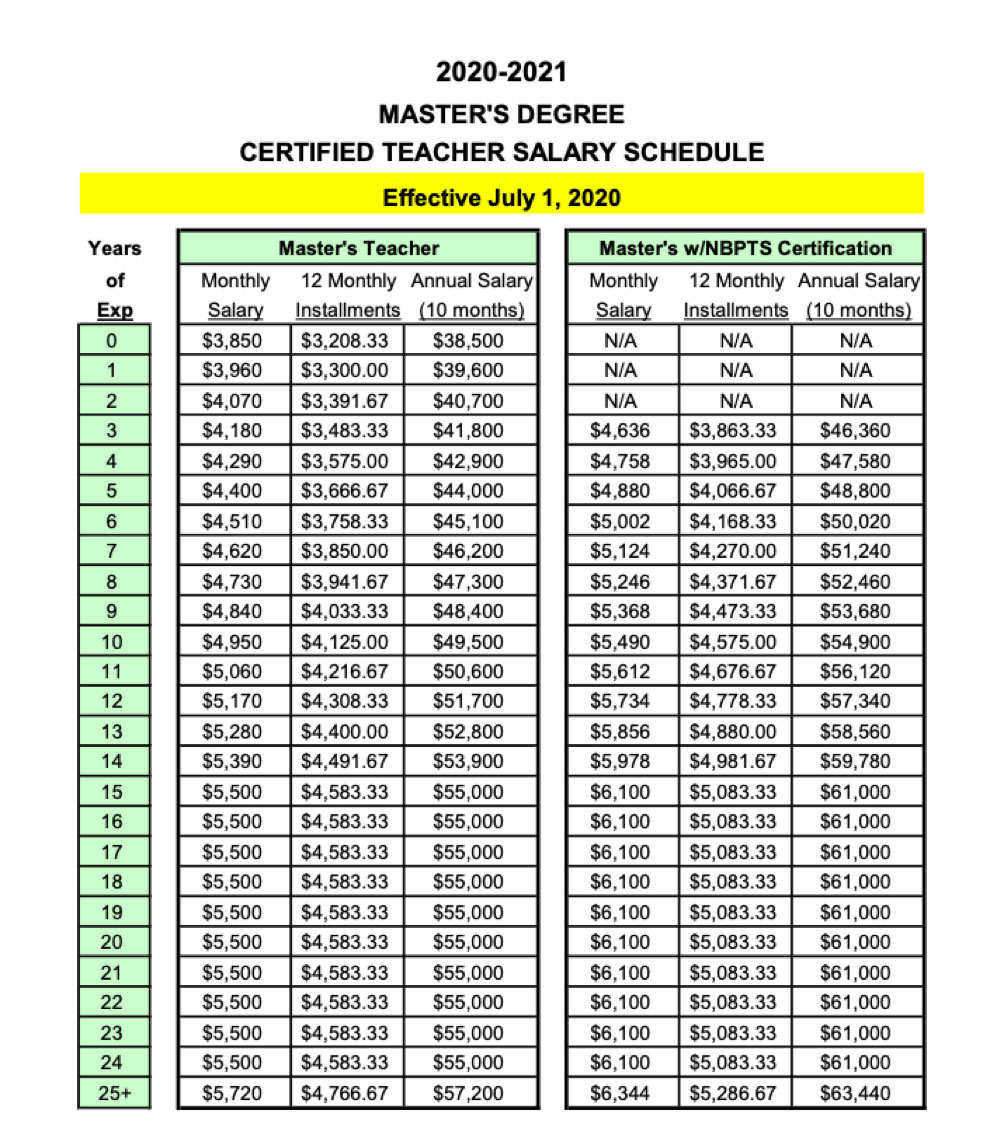Teacher Salary & Teacher Pay – What to Expect?

Teaching: It's a noble, rewarding profession that's long fallen short in terms of earning potential.
But in recent years, the outlook for the teaching profession looks quite different. Thanks, in part, to a national movement pushing for increased school funding and teacher pay, salaries in education are stronger than ever.
In February 2018, West Virginia educators fought for-and earned-increased funding in their schools and better pay. The shuttering of all schools in the state caught the attention of teachers nationwide, inspiring many to fight for their profession, as well. The following spring saw educators striking in Oklahoma and Arizona, walking out of classrooms in Kentucky, North Carolina, and Colorado, and shutting down learning in some of our country's largest cities, including Chicago, Denver, Los Angeles, and Oakland.
While not all states saw the change they had hoped for, in states like Arizona, where a statewide strike forced the legislature to give teachers a 20% pay raise, history was made.
Some call it a revolution, but it's simply a response to something that has been long overdue.
Although there's still a long way to go, today the teaching profession is stronger and more united and the prospects for becoming a teacher have never been brighter.
If you are considering becoming a teacher but want to get the lay of the land as far as compensation goes, this guide will answer your most pressing questions. It includes a teacher salary breakdown, how teachers can earn more, and other pressing questions, read on.

How Much Do Teachers Get Paid?
From elementary to middle to high school, you'll find salaries for teachers fairly consistent. As of May 2020, the Bureau of Labor Statistics reported the following average salaries for teachers, according to grade level:
- Elementary school teachers: $65,420
- Middle school teachers $64,990
- High school teachers: $67,340
Early career educators with just a few years of experience can expect to earn salaries that reflect the profession's 25th percentile:
- Elementary school: $48,350
- Middle school: $48,870
- High school: $49,990
Educators who have significant experience, a graduate-level teaching degree, and/or National Board Certification earn salaries that best reflect the profession's 90th percentile:
- Elementary school: $100,480
- Middle school: $98,840
- High school: $102,130
You also won't find much discrepancy in earning potential when it comes to subjects taught and/or area of certification. In other words, regardless of whether you're teaching proper diet and nutrition as a middle school physical education teacher or American history to a class of high schoolers, chances are good that you'll earn a similar salary if you hold similar credentials.
That's because in the public educational system, states and/or school districts follow strict salary schedules that determine teacher salaries based on either experience alone or on a combination of experience and education. (Merit-based pay is largely unheard of in public K-12 education, with the exception of a few school districts like the Dallas Independent School District, which uses a merit-based system to determine salaries based on teacher performance.)
The only exception to this rule occurs when states or school districts offer salary incentives in an effort to fill specific teacher shortage areas (each state reports their teacher shortage areas to the U.S. Department of Education on an annual basis) and/or teaching positions in high-needs schools (defined as a certain percentage of the student population meeting specific federal poverty guidelines). However, because schools utilize pre-approved salary schedules, these salary incentives are often in the form of signing bonuses, annual stipends, or student loan repayment.
Most school districts utilize a step and lane system for their salary schedules that consists of different steps according to years of teaching experience and then lanes within each step that provide for higher salaries for those educators who have earned an education beyond a bachelor's degree.
While just three states- Connecticut, Maryland, and New York- require a graduate degree to maintain a teaching license, some states incentivize teachers to earn a master's degree or higher by offering an optional, advanced license which, of course, comes with a salary increase. The Education Commission of the States found that about one-third of all states have advanced licensure for educators.
A couple good examples of school districts that utilize a step and level salary schedule system for teachers include:
The Philadelphia School District recognizes steps for experience and then levels within each step to account for educators with bachelor's degrees, master's degrees, master's degrees +30, and doctorate degrees.

Source: https://jobs.philasd.org/opportunities/teachers/salary-schedule/
While most states leave educator compensation up to the individual school districts, about 17 states have chosen to play a large role in teacher salaries by instituting statewide teacher salary schedules in an effort to ensure minimum salaries for teachers. Like school districts, most states choose a step and lane salary schedule that takes both education and experience into account.
North Carolina is one such state that publishes a statewide teacher salary schedule through its Department of Public Instruction. The Department recognizes advanced pay for teachers with master's degrees, educational specialist (sixth year) degrees, and doctorate degrees, along with additional pay bumps for educators with bachelor's degrees and above who have earned National Board Certification.


Source: https://www.dpi.nc.gov/media/8596/download
Starting Salaries for Teachers
When reviewing the salary information included in this article, it is worth keeping in mind that teaching is a job that typically offers compensation commensurate with experience, as measured by certain benchmarks provided by the school district. However, it's not always easy to predict what one's starting salary will be: different institutions offer different models, and the Bureau of Labor Statistics does not provide data focused exclusively on starting salaries.
Indeed, starting salaries for teachers can vary significantly depending on a variety of factors, including the state and school district in which they are working.
Another factor that can impact starting salaries for teachers is the level of education they have completed: in general, teachers with more advanced degrees tend to earn higher salaries.
This is sometimes because they are offered rewards in the form of bonuses and stipends, and sometimes because they are eligible for higher-ranking positions which are compensated accordingly.
When thinking about your starting salary, one piece of good news: the majority of teacher credential programs put you right in the classroom at the same time that you complete your coursework, meaning you'll be earning a full-time income at the same time that you're in school. This means that by the time you have completed your program, you are likely to have leveled up into the next salary bracket.

Teachers' Salary in Each State
Where you live remains one of the biggest indicators of how much you'll earn as a teacher.
At the state level, there's a clear difference between average salaries among teachers based on geography alone, with cost of living remaining a major indicator.
As of August 2023, teachers earned the highest average salaries in the following states:
Elementary School Teachers
- California: $90,470
- New York: $89,580
- Washington: $85,580
- Connecticut: $84,580
- Massachusetts: $82,690
Middle School Teachers
- New York: $93,380
- California: $93,000
- Washington: $86,000
- Massachusetts: $85,460
- Connecticut: $82,600
High School Teachers
- California: $92,960
- New York: $91,290
- Washington: $88,530
- Massachusetts: $82,960
- Connecticut: $80,230
The following May 2020 BLS tables provide a glimpse into what teachers are earning at every level (25th percentile = early career, 90th percentile = experienced) in each state:
Elementary School Teacher Salaries by State
| State | Annual 25th Percentile Wage | Annual Median Wage | Annual 90th Percentile Wage |
|---|---|---|---|
| Alabama | 44640 | 52150 | 63680 |
| Alaska | 61190 | 73920 | 102850 |
| Arizona | 39850 | 46280 | 64710 |
| Arkansas | 42080 | 48490 | 64240 |
| California | 65030 | 85970 | 122210 |
| Colorado | 44420 | 53250 | 80270 |
| Connecticut | 62540 | 79920 | 106060 |
| Delaware | 51950 | 65310 | 92740 |
| District of Columbia | 60830 | 76090 | 118360 |
| Florida | 43850 | 56540 | 82840 |
| Georgia | 49730 | 60840 | 82040 |
| Hawaii | 55090 | 64210 | 85310 |
| Idaho | 40810 | 49730 | 72270 |
| Illinois | 48550 | 62780 | 101720 |
| Indiana | 42090 | 50050 | 77330 |
| Iowa | 43850 | 54680 | 77180 |
| Kansas | 44660 | 51850 | 76480 |
| Kentucky | 44910 | 53250 | 67220 |
| Louisiana | 43930 | 48700 | 62200 |
| Maine | 41880 | 52000 | 77110 |
| Maryland | 58990 | 75820 | 112940 |
| Massachusetts | 64760 | 82520 | 123700 |
| Michigan | 49110 | 66260 | 100730 |
| Minnesota | 48040 | 60210 | 91190 |
| Mississippi | 36730 | 43470 | 57390 |
| Missouri | 37980 | 46730 | 81810 |
| Montana | 38980 | 48940 | 73940 |
| Nebraska | 50320 | 60300 | 86340 |
| Nevada | 46630 | 55080 | 79280 |
| New Hampshire | 48380 | 60060 | 81830 |
| New Jersey | 59790 | 70920 | 100760 |
| New Mexico | 47150 | 58060 | 92110 |
| New York | 59020 | 80040 | 131730 |
| North Carolina | 42030 | 49300 | 65340 |
| North Dakota | 44920 | 52530 | 77940 |
| Ohio | 50110 | 65210 | 91920 |
| Oklahoma | 38280 | 45810 | 71760 |
| Oregon | 52310 | 69580 | 110540 |
| Pennsylvania | 54780 | 67210 | 99930 |
| Rhode Island | 56980 | 74570 | 99920 |
| South Carolina | 41460 | 50920 | 76720 |
| South Dakota | 37950 | 44670 | 59500 |
| Tennessee | 44490 | 51530 | 73390 |
| Texas | 51800 | 57690 | 68760 |
| Utah | 43850 | 53940 | 92120 |
| Vermont | 49510 | 60310 | 87040 |
| Virginia | 49670 | 67830 | 117080 |
| Washington | 59040 | 73260 | 103720 |
| West Virginia | 41680 | 47330 | 62280 |
| Wisconsin | 46970 | 56970 | 79620 |
| Wyoming | 52180 | 59210 | 77010 |
Middle School Teacher Salaries by State
| State | Annual 25th Percentile Wage | Annual Median Wage | Annual 90th Percentile Wage |
|---|---|---|---|
| Alabama | 46130 | 53880 | 64210 |
| Alaska | 65920 | 78580 | 108150 |
| Arizona | 39030 | 45310 | 62450 |
| Arkansas | 43280 | 50270 | 67600 |
| California | 64160 | 82810 | 111180 |
| Colorado | 44420 | 52730 | 80160 |
| Connecticut | 64150 | 82480 | 108130 |
| Delaware | 52150 | 64920 | 84830 |
| District of Columbia | 62230 | 78160 | 109560 |
| Florida | 46200 | 57280 | 84940 |
| Georgia | 48960 | 59980 | 83560 |
| Guam | 38660 | 47630 | 64570 |
| Hawaii | 54610 | 64150 | 86890 |
| Idaho | 43790 | 51370 | 74610 |
| Illinois | 48830 | 61830 | 99560 |
| Indiana | 43510 | 51590 | 78630 |
| Iowa | 45210 | 55650 | 80210 |
| Kansas | 46410 | 55130 | 82850 |
| Kentucky | 45570 | 53660 | 69520 |
| Louisiana | 44250 | 49490 | 62660 |
| Maine | 48140 | 59310 | 79000 |
| Maryland | 57750 | 75020 | 118230 |
| Massachusetts | 64840 | 80730 | 115230 |
| Michigan | 47410 | 63950 | 90600 |
| Minnesota | 47250 | 60640 | 96800 |
| Mississippi | 39670 | 46570 | 64510 |
| Missouri | 39870 | 49260 | 82330 |
| Montana | 39660 | 55230 | 80380 |
| Nebraska | 50580 | 60990 | 85930 |
| Nevada | 48970 | 59380 | 81840 |
| New Hampshire | 48980 | 60970 | 83470 |
| New Jersey | 60630 | 73160 | 101860 |
| New Mexico | 43040 | 51210 | 69600 |
| New York | 64250 | 85370 | 134170 |
| North Carolina | 43120 | 50450 | 66640 |
| North Dakota | 47840 | 57290 | 86970 |
| Ohio | 48360 | 64740 | 93680 |
| Oklahoma | 39140 | 46600 | 71140 |
| Oregon | 51870 | 66100 | 99380 |
| Pennsylvania | 53150 | 66480 | 108780 |
| Puerto Rico | 27920 | 32940 | 48080 |
| Rhode Island | 66090 | 78490 | 100670 |
| South Carolina | 43820 | 53150 | 74970 |
| South Dakota | 39070 | 45400 | 59990 |
| Tennessee | 44840 | 51780 | 72760 |
| Texas | 51710 | 57770 | 70620 |
| Utah | 49300 | 64480 | 98180 |
| Vermont | 48270 | 60690 | 90400 |
| Virginia | 50360 | 69360 | 118340 |
| Washington | 60730 | 75740 | 105410 |
| West Virginia | 42440 | 48230 | 63900 |
| Wisconsin | 48530 | 58240 | 81200 |
| Wyoming | 53480 | 60400 | 79020 |
Secondary School Teacher Salaries by State
| State | Annual 25th Percentile Wage | Annual Median Wage | Annual 90th Percentile Wage |
|---|---|---|---|
| Alabama | 45690 | 53440 | 64910 |
| Alaska | 62960 | 75600 | 104160 |
| Arizona | 43440 | 50780 | 76200 |
| Arkansas | 43760 | 51310 | 70840 |
| California | 70650 | 88420 | 119990 |
| Colorado | 45480 | 55270 | 82510 |
| Connecticut | 60550 | 78240 | 106950 |
| Delaware | 56130 | 68360 | 89200 |
| District of Columbia | 48020 | 64020 | 101170 |
| Florida | 47790 | 60470 | 86270 |
| Georgia | 50090 | 61360 | 82470 |
| Guam | 40130 | 49830 | 70130 |
| Hawaii | 55490 | 64750 | 88840 |
| Idaho | 40970 | 50520 | 74070 |
| Illinois | 53100 | 70740 | 122320 |
| Indiana | 42600 | 50940 | 77610 |
| Iowa | 45960 | 57140 | 81550 |
| Kansas | 44570 | 53140 | 78840 |
| Kentucky | 46810 | 55540 | 74130 |
| Louisiana | 44910 | 50810 | 65440 |
| Maine | 45730 | 57020 | 78100 |
| Maryland | 59260 | 76840 | 112500 |
| Massachusetts | 66050 | 83680 | 118890 |
| Michigan | 48480 | 62210 | 88390 |
| Minnesota | 49930 | 62410 | 91080 |
| Mississippi | 37950 | 45400 | 63250 |
| Missouri | 37920 | 45290 | 67560 |
| Montana | 39800 | 50720 | 78590 |
| Nebraska | 51450 | 62090 | 81730 |
| Nevada | 47430 | 57090 | 80560 |
| New Hampshire | 50130 | 62170 | 82440 |
| New Jersey | 63420 | 77790 | 107200 |
| New Mexico | 45870 | 55740 | 80820 |
| New York | 65600 | 86230 | 133150 |
| North Carolina | 42750 | 50360 | 68070 |
| North Dakota | 45510 | 54200 | 78600 |
| Ohio | 51250 | 66420 | 93460 |
| Oklahoma | 41270 | 48370 | 68890 |
| Oregon | 54870 | 72370 | 108930 |
| Pennsylvania | 54590 | 67180 | 100240 |
| Puerto Rico | 27940 | 32700 | 48500 |
| Rhode Island | 63860 | 79010 | 101250 |
| South Carolina | 42580 | 53180 | 77040 |
| South Dakota | 38660 | 45320 | 61070 |
| Tennessee | 45250 | 52770 | 75630 |
| Texas | 52290 | 58400 | 74230 |
| Utah | 49670 | 61570 | 101030 |
| Vermont | 51810 | 63080 | 97750 |
| Virgin Islands | 42790 | 48670 | 64400 |
| Washington | 61970 | 76820 | 105300 |
| West Virginia | 42970 | 48780 | 64150 |
| Wisconsin | 48280 | 58630 | 80630 |
| Wyoming | 53920 | 61730 | 79540 |
Job Growth for Teachers
Jobs for elementary school teachers are projected to grow at a rate of 4% between 2021 and 2031, in line with the national average for all occupations. The same goes for jobs for middle school teachers. Job opportunities for high school teachers, meanwhile, are projected to grow at a rate of approximately 5% between 2021 and 2031.
However, demand for preschool teachers during this time is projected to increase by about 15%, largely due to an increase in state- and federally funded preschool programs.

Preschool Teacher Salary
Preschool teachers may work in a variety of settings, from public and private PreK-12 schools to private daycare centers, federally funded preschool programs, and church- and community-based preschool programs. Because of this, salaries for preschool teachers tend to vary widely.
According to the BLS, preschool teachers earned an average salary of $38,640 as of May 2021. Early career preschool teachers earned about $26,220 (25th percentile), while experienced preschool teachers earn about $58,230 (90th percentile) during this time.
Preschool teachers working in elementary and secondary schools earned the highest average salary during this time, at $53,200, while those working outside of the public school setting earned significantly less:
- Child daycare services: $34,480
- Individual and family services (family social services, counseling, etc.): $39,470
- Religious organizations: $40,960
- Civic and social organizations (e.g., YMCA): $37,040
- Social advocacy organizations (e.g., Head Start): $54,250
According to the Bureau of Labor Statistics, as of May 2021, preschool teachers earned the highest average salaries in the following states:
- District of Columbia: $59,110
- California: $48,410
- New York: $46,420
- New Jersey: $45,750
- Massachusetts: $43,750
The following BLS table provides a closer look at what preschool teachers are earning at every level (25thpercentile = early career, 90th percentile = experienced) in each state, as of May 2020:
Preschool Teacher Salaries by State
| State | Annual 25th Percentile Wage | Annual Median Wage | Annual 90th Percentile Wage |
|---|---|---|---|
| Alabama | 17840 | 20730 | 34180 |
| Alaska | 25850 | 33250 | 53660 |
| Arizona | 25730 | 29930 | 47470 |
| Arkansas | 23400 | 30390 | 49820 |
| California | 30510 | 36420 | 57400 |
| Colorado | 28280 | 33570 | 59550 |
| Connecticut | 29150 | 35080 | 66930 |
| Delaware | 24210 | 28230 | 39090 |
| District of Columbia | 36070 | 43210 | 64120 |
| Florida | 22160 | 25740 | 44670 |
| Georgia | 23420 | 29850 | 57020 |
| Hawaii | 32900 | 39170 | 61560 |
| Idaho | 21480 | 24490 | 35020 |
| Illinois | 26550 | 30960 | 52760 |
| Indiana | 22830 | 27580 | 39730 |
| Iowa | 23360 | 28720 | 46720 |
| Kansas | 23770 | 34840 | 63000 |
| Kentucky | 24320 | 35250 | 59440 |
| Louisiana | 23020 | 29250 | 44300 |
| Maine | 31080 | 36070 | 53410 |
| Maryland | 27750 | 34380 | 79080 |
| Massachusetts | 33010 | 38560 | 65760 |
| Michigan | 23790 | 30430 | 53210 |
| Minnesota | 33120 | 37900 | 56720 |
| Mississippi | 22910 | 29120 | 45130 |
| Missouri | 25530 | 32730 | 49990 |
| Montana | 23410 | 29660 | 50330 |
| Nebraska | 29280 | 37770 | 62080 |
| Nevada | 25140 | 28280 | 54270 |
| New Hampshire | 27350 | 30680 | 43180 |
| New Jersey | 28280 | 39440 | 81570 |
| New Mexico | 22480 | 31100 | 58830 |
| New York | 30700 | 39850 | 70900 |
| North Carolina | 23080 | 28260 | 46950 |
| North Dakota | 22760 | 26080 | 39430 |
| Ohio | 23570 | 28470 | 46920 |
| Oklahoma | 22590 | 29270 | 54550 |
| Oregon | 26560 | 31310 | 44770 |
| Pennsylvania | 24260 | 29340 | 45760 |
| Rhode Island | 25930 | 29800 | 59090 |
| South Carolina | 21260 | 25060 | 54820 |
| South Dakota | 26290 | 31180 | 44110 |
| Tennessee | 22570 | 30190 | 54970 |
| Texas | 26610 | 37050 | 64670 |
| Utah | 23100 | 27800 | 39190 |
| Vermont | 33140 | 37030 | 52630 |
| Virginia | 25120 | 34360 | 65060 |
| Washington | 29930 | 32450 | 47960 |
| West Virginia | 22680 | 30720 | 56990 |
| Wisconsin | 22980 | 27080 | 40190 |
| Wyoming | 22950 | 26320 | 52220 |
Learn more about how to become a preschool teacher.
How Will Education Affect a Preschool Teacher's Pay?
There's been a seismic shift in preschool education in recent years. No longer is the education of our youngest students viewed as optional or unimportant. Thanks to a number of studies (including this one from the Harvard Graduate School of Education) finding that quality early childhood education is vital for the long-term success of students, both state- and federally funded preschool programs are on the rise.
With a renewed importance placed on preschool education, more often than not, today's preschool teachers hold credentials that mirror their K-12 counterparts. According to the National Institute for Early Education Research (NIEER), 78% of all state-funded public preschool programs, 56% of state-funded private preschool programs, and 75% of state-funded preschool programs that serve both public and private settings required teachers to hold at least a bachelor's degree in early childhood education and a teaching certification.
Master's degrees in early childhood education are also becoming more commonplace, particularly among educators in public school systems and those seeking to attain leadership positions.
How Will Experience Affect a Preschool Teacher's Annual Pay?
Experience nearly always plays a part in a preschool teacher's salary. In fact, it is quite common for preschool teachers in public school settings to be paid according to K-12 salary schedules which are, more often than not, structured to account for years of teaching experience.
Elementary School Teacher Salary
Elementary/primary school teachers are those that typically teach grades kindergarten through five, though some schools may also include sixth grade or preschool programs. These teachers are responsible for teaching every subject area each day to a single class of students.
Learn more about how to become an elementary school teacher.
Average Teachers Salary for Elementary School
According to the BLS, as of May 2021, elementary school teachers earned an average salary of $68,000.
In public schools, elementary school teachers earned an average salary of $68,050, while in religious-based private schools, they earned significantly less, at just $48,770. Elementary school teachers working outside of the classroom in educational support services earned an average salary of $54,580 during this time.
How Will Education Affect an Elementary School Teacher's Pay?
Elementary school teachers working in the public K-12 system must hold a bachelor's degree that's part of a state-approved teacher preparation program to earn state licensure to teach. The vast majority of private schools also require elementary school teachers to hold a minimum of a bachelor's degree to teach.
However, a master's degree or higher has become a standard pursuit among elementary school teachers who want to increase their earning potential and qualify for more career opportunities.
How Will Experience Affect an Elementary Teacher Salary?
Experience continues to play a major role in what you can expect to earn as an elementary school teacher. Nearly all schools/school districts pay educators according to the number of years of relevant teaching experience.

Middle School Teacher Salary
Middle school teachers, who usually teach children grades 5-8, teach a single subject to multiple classes a day. Middle school teachers are certified to teach subjects like English, science, social studies, math, foreign languages, music, and physical education.
Learn more about how to become a middle school teacher.
Average Salary for a Middle School Teacher
According to the BLS, middle school teachers earned an average salary of $67,790 as of May 2021.
The average salary for middle school teachers in the public school setting was $67,820 during this time, while those in religious-based (private) schools earned significantly less, at $48,030. Middle school teachers providing instruction outside of the traditional classroom setting earned the following average salaries during this time:
- Educational support services: $46,280
- Other Schools and Instruction: $53,350
- Residential care facilities: $41,390
How Will Education Affect a Middle School Teacher's Pay?
To teach at the middle school level in the public school system, you'll need a minimum of a bachelor's degree within an approved teacher preparation program to earn state licensure. In private school settings, residential care settings, and in other settings outside of the public school system, a bachelor's degree remains the minimum educational requirement for middle school teachers.
However, a master's degree or above often results in a higher salary and more professional opportunities. Most school districts recognize middle school teachers with graduate degrees by offering them higher salaries or other financial incentives like annual stipends or bonuses.
How Will Experience Affect a Middle School Teacher Salary?
In nearly all cases, salaries for middle school teachers increase along with years of experience. Seasoned middle school teachers with years of experience on their resume will always earn more than mid-career professionals, and mid-career professionals will always earn more than their early-career colleagues.

High School Teacher Salary
High school teachers most often teach a single subject to multiple classes throughout the day. These classes may be of one grade level or of different grade levels, depending on the school or district.
Learn more about how to become a high school teacher.
Average Salary for a High School Teacher
As of May 2022, the BLS reported an average salary of $69,480 for high school (secondary) teachers.
High school teachers working in the public K-12 system earned an average salary of $69,520 during this time, while those in religious (private) schools earned an average salary of $58,950.
Outside of the traditional classroom setting, the BLS reports the following average salaries for high school teachers, as of May 2022:
- Psychiatric and substance abuse hospitals: $73,760
- State government: $98,120
- Other residential care facilities: $47,270
- Educational support services: $65,100
How Will Education Affect a High School Teacher's Annual Income?
While a bachelor's degree in secondary education remains the minimum educational requirement to become a high school teacher, it's become quite commonplace for high school teachers to pursue a graduate degree in education. In most school districts, a master's degree or higher results in a salary increase or annual stipend or bonus.
How Will Experience Affect a High School Teacher's Yearly Income?
Experience remains the biggest indicator of what you'll earn as a high school teacher. In fact, you'll find that the vast majority of all salary schedules are based on steps according to years of relevant experience. In many school districts, the difference between an early-career educator and an experienced one can be as much as $30,000-$40,000 more annually.
Special Education Teacher Salary
A special education teacher works with students who have exceptionalities in various areas related to education. These teachers may work with students with physical, emotional, behavioral, or mental limitations. Special education teachers may even work with students who are highly gifted and talented.
According to the BLS, special education teachers earned the following average salaries as of May 2022:
- Preschool: $69,620
- Elementary School: $68,580
- Middle School: $69,530
- High School: $71,290
Special education teachers outside of the traditional classroom earned the following average salaries during this time:
Preschool
- Child daycare services: $88,000
- Individual and family services: $69,800
- Offices of other health practitioners: $67,240
- Educational support services: $85,390
Elementary School
- Educational support services: $68,620
- Vocational rehabilitation services: $61,270
- Other residential care facilities: $59,010
- Individual and family services: $60,950
- Other residential facilities: $59,010
Middle School
- Local government: $73,730
- Other residential care facilities: $52,510
High School
- Educational support services: $66,000
- Residential intellectual and developmental disability, mental health, and substance abuse facilities: $57,350
- Other residential care facilities: $51,600
- Psychiatric and substance abuse hospitals: $62,060
The following May 2020 BLS tables provides more insight into what special education teachers are earning at every level (25th percentile = early career, 90th percentile = experienced) and at every grade level, by state:
Salaries by State - Special Education Teachers, Preschool
| State | Annual 25th Percentile Wage | Annual Median Wage | Annual 90th Percentile Wage |
|---|---|---|---|
| Alabama | 38370 | 46780 | 62380 |
| Alaska | 59950 | 72570 | 93120 |
| Arizona | 42620 | 48630 | 66640 |
| Arkansas | 33330 | 46550 | 63600 |
| California | 42110 | 50200 | 99720 |
| Colorado | 47520 | 57600 | 83070 |
| Connecticut | 53100 | 63270 | 99310 |
| District of Columbia | 52920 | 65020 | 104310 |
| Florida | 44380 | 60630 | 97980 |
| Georgia | 25020 | 43820 | 75060 |
| Hawaii | 47980 | 60200 | 81800 |
| Illinois | 42490 | 54200 | 89380 |
| Indiana | 35570 | 44430 | 68060 |
| Iowa | 43110 | 48800 | 76780 |
| Kansas | 47180 | 57240 | 82450 |
| Kentucky | 53550 | 59330 | 77600 |
| Maine | 27690 | 31550 | 39900 |
| Maryland | 29590 | 66360 | 107820 |
| Massachusetts | 43920 | 60920 | 109590 |
| Michigan | 52590 | 66690 | 81780 |
| Minnesota | 49300 | 60970 | 93420 |
| Mississippi | 36440 | 42690 | 66810 |
| Missouri | 39010 | 46090 | 73550 |
| Montana | 58860 | 70960 | 99470 |
| Nebraska | 42670 | 55030 | 76430 |
| Nevada | 48520 | 56080 | 64530 |
| New Hampshire | 50660 | 59470 | 72130 |
| New Jersey | 59910 | 70580 | 96590 |
| New Mexico | 40670 | 47300 | 66010 |
| New York | 58330 | 81000 | 154420 |
| North Carolina | 43240 | 54060 | 76810 |
| North Dakota | 49960 | 61930 | 80090 |
| Ohio | 46180 | 64100 | 103180 |
| Oklahoma | 33910 | 37880 | 51770 |
| Oregon | 63860 | 84740 | 132600 |
| Pennsylvania | 34970 | 47210 | 86280 |
| Rhode Island | 27800 | 30390 | 75990 |
| South Carolina | 27700 | 51970 | 84110 |
| Tennessee | 41520 | 50480 | 75850 |
| Texas | 45390 | 55960 | 70500 |
| Utah | 29260 | 37380 | 62440 |
| Vermont | 39470 | 56080 | 82090 |
| Washington | 56380 | 69470 | 101030 |
| Wisconsin | 44450 | 52290 | 67570 |
| Wyoming | 37890 | 53570 | 77870 |
Salaries by State - Special Education Teachers, Kindergarten and Elementary School
| State | Annual 25th Percentile Wage | Annual Median Wage | Annual 90th Percentile Wage |
|---|---|---|---|
| Alabama | 43570 | 51230 | 63960 |
| Alaska | 63710 | 75200 | 103180 |
| Arizona | 40530 | 47300 | 65890 |
| Arkansas | 43030 | 49390 | 64850 |
| California | 54300 | 75950 | 122200 |
| Colorado | 45370 | 53870 | 80350 |
| Connecticut | 61390 | 78720 | 105080 |
| Delaware | 50410 | 61070 | 86630 |
| District of Columbia | 58990 | 74960 | 119190 |
| Florida | 49670 | 65400 | 86850 |
| Georgia | 50520 | 61860 | 86440 |
| Hawaii | 53650 | 60670 | 80010 |
| Idaho | 40680 | 51430 | 75540 |
| Illinois | 51520 | 63530 | 102590 |
| Indiana | 38130 | 48100 | 81340 |
| Iowa | 44490 | 54820 | 79120 |
| Kansas | 47680 | 58080 | 84090 |
| Kentucky | 44980 | 52890 | 65640 |
| Louisiana | 44040 | 49070 | 62210 |
| Maine | 44110 | 52640 | 76530 |
| Maryland | 51480 | 73180 | 110130 |
| Massachusetts | 57440 | 74770 | 112700 |
| Michigan | 49830 | 63140 | 91810 |
| Minnesota | 46050 | 56880 | 82290 |
| Mississippi | 40930 | 46940 | 63700 |
| Missouri | 43630 | 54070 | 97120 |
| Montana | 40850 | 48720 | 70400 |
| Nebraska | 45270 | 56990 | 81320 |
| Nevada | 46860 | 55040 | 78950 |
| New Hampshire | 48470 | 59290 | 82030 |
| New Jersey | 59190 | 69130 | 101080 |
| New Mexico | 45170 | 55550 | 92810 |
| New York | 56690 | 74530 | 124540 |
| North Carolina | 43080 | 50250 | 68130 |
| North Dakota | 49650 | 59730 | 88870 |
| Ohio | 45570 | 58910 | 84540 |
| Oklahoma | 41010 | 48990 | 77320 |
| Oregon | 63870 | 77200 | 113950 |
| Pennsylvania | 52640 | 63650 | 91730 |
| Rhode Island | 60390 | 78080 | 100960 |
| South Carolina | 41950 | 51450 | 75680 |
| South Dakota | 38410 | 44990 | 60510 |
| Tennessee | 45870 | 52980 | 75670 |
| Texas | 52840 | 58090 | 69330 |
| Utah | 35530 | 49510 | 81230 |
| Vermont | 49280 | 59370 | 81570 |
| Virginia | 48720 | 63880 | 107660 |
| Washington | 58180 | 70070 | 100680 |
| West Virginia | 35440 | 45380 | 63060 |
| Wisconsin | 45410 | 53440 | 77330 |
| Wyoming | 52910 | 60130 | 77950 |
Salaries by State - Special Education Teachers, Middle School
| State | Annual 25th Percentile Wage | Annual Median Wage | Annual 90th Percentile Wage |
|---|---|---|---|
| Alabama | 38370 | 46780 | 62380 |
| Alaska | 59950 | 72570 | 93120 |
| Arizona | 42620 | 48630 | 66640 |
| Arkansas | 33330 | 46550 | 63600 |
| California | 42110 | 50200 | 99720 |
| Colorado | 47520 | 57600 | 83070 |
| Connecticut | 53100 | 63270 | 99310 |
| District of Columbia | 52920 | 65020 | 104310 |
| Florida | 44380 | 60630 | 97980 |
| Georgia | 25020 | 43820 | 75060 |
| Hawaii | 47980 | 60200 | 81800 |
| Illinois | 42490 | 54200 | 89380 |
| Indiana | 35570 | 44430 | 68060 |
| Iowa | 43110 | 48800 | 76780 |
| Kansas | 47180 | 57240 | 82450 |
| Kentucky | 53550 | 59330 | 77600 |
| Maine | 27690 | 31550 | 39900 |
| Maryland | 29590 | 66360 | 107820 |
| Massachusetts | 43920 | 60920 | 109590 |
| Michigan | 52590 | 66690 | 81780 |
| Minnesota | 49300 | 60970 | 93420 |
| Mississippi | 36440 | 42690 | 66810 |
| Missouri | 39010 | 46090 | 73550 |
| Montana | 58860 | 70960 | 99470 |
| Nebraska | 42670 | 55030 | 76430 |
| Nevada | 48520 | 56080 | 64530 |
| New Hampshire | 50660 | 59470 | 72130 |
| New Jersey | 59910 | 70580 | 96590 |
| New Mexico | 40670 | 47300 | 66010 |
| New York | 58330 | 81000 | 154420 |
| North Carolina | 43240 | 54060 | 76810 |
| North Dakota | 49960 | 61930 | 80090 |
| Ohio | 46180 | 64100 | 103180 |
| Oklahoma | 33910 | 37880 | 51770 |
| Oregon | 63860 | 84740 | 132600 |
| Pennsylvania | 34970 | 47210 | 86280 |
| Rhode Island | 27800 | 30390 | 75990 |
| South Carolina | 27700 | 51970 | 84110 |
| Tennessee | 41520 | 50480 | 75850 |
| Texas | 45390 | 55960 | 70500 |
| Utah | 29260 | 37380 | 62440 |
| Vermont | 39470 | 56080 | 82090 |
| Washington | 56380 | 69470 | 101030 |
| Wisconsin | 44450 | 52290 | 67570 |
| Wyoming | 37890 | 53570 | 77870 |
Salaries by State - Special Education Teachers, Secondary School
<td-<td-<td-
| State | Annual 25th Percentile Wage | Annual Median Wage | Annual 90th Percentile Wage |
|---|---|---|---|
| Alabama | 46880 | 54950 | 64730 |
| Alaska | 62800 | 76250 | 105280 |
| Arizona | 43620 | 50420 | 72300 |
| Arkansas | 43230 | 49920 | 66040 |
| California | 65460 | 84340 | 116800 |
| Colorado | 46350 | 56200 | 81790 |
| Connecticut | 58830 | 78050 | 110260 |
| Delaware | 56000 | 68150 | 96840 |
| District of Columbia | 62140 | 78390 | 121500 |
| Florida | 46960 | 57950 | 97150 |
| Georgia | 51940 | 59750 | 80730 |
| Idaho | 47100 | 53960 | 65440 |
| Illinois | 52150 | 66150 | 110210 |
| Indiana | 37910 | 48750 | 77680 |
| Iowa | 50740 | 59360 | 80470 |
| Kansas | 48750 | 59220 | 84000 |
| Kentucky | 46480 | 54860 | 66930 |
| Louisiana | 45720 | 51890 | 64190 |
| Maine | 40350 | 50680 | 76830 |
| Maryland | 65590 | 82710 | 112130 |
| Massachusetts | 61130 | 77190 | 111850 |
| Michigan | 51300 | 65890 | 82270 |
| Minnesota | 46870 | 61510 | 98650 |
| Mississippi | 42150 | 48150 | 66230 |
| Missouri | 38840 | 45940 | 64110 |
| Montana | 48270 | 59850 | 80250 |
| Nebraska | 53370 | 61210 | 83110 |
| Nevada | 46760 | 55210 | 79330 |
| New Hampshire | 50930 | 61120 | 81220 |
| New Jersey | 63400 | 76600 | 105530 |
| New Mexico | 44170 | 54990 | 81480 |
| New York | 63930 | 80270 | 126570 |
| North Carolina | 44090 | 52680 | 68990 |
| North Dakota | 52370 | 60050 | 79890 |
| Ohio | 43260 | 56550 | 84380 |
| Oklahoma | 41420 | 48890 | 74930 |
| Oregon | 61800 | 81220 | 124090 |
| Pennsylvania | 54140 | 66710 | 97590 |
| Rhode Island | 70270 | 83630 | 101810 |
| South Carolina | 33110 | 40140 | 63180 |
| South Dakota | 39430 | 46320 | 61870 |
| Tennessee | 46530 | 54540 | 77300 |
| Texas | 52660 | 58400 | 73000 |
| Utah | 21860 | 47570 | 74460 |
| Vermont | 54180 | 64930 | 82190 |
| Virginia | |||
| Washington | 61920 | 75580 | 104130 |
| West Virginia | 39050 | 51450 | 71950 |
| Wisconsin | 46040 | 54990 | 79220 |
| Wyoming | 54990 | 61770 | 80150 |
Learn more about how to become a special education teacher.
How Will Education Affect a Special Education Teacher's Pay?
Special education teachers, like their general education colleagues, must earn, at a minimum, a bachelor's degree within an approved teacher preparation program to teach in the public or private school setting.
However, many special education teachers pursue a master's degree or higher to earn a higher salary, earn another endorsement to their teaching certificate, and gain advanced skills in a specific area of special education, such as:
- Blind/visually impaired
- Deaf/hard of hearing
- Speech/language or communication
- Autism
- Adaptive special education
- Emotional disabilities
- Behavioral disorders
- Orthopedic/physical disabilities
How Will Experience Affect a Special Education Teacher's Annual Income?
Like their general education counterparts, special education teachers earn salaries that are directly related to their experience level. While some school districts recognize advanced degrees, all follow a salary schedule that is based on the number of years of relevant teaching experience.

Salary for Teacher Assistants
Teacher assistants work alongside teachers in public, private, and religious schools, and in other settings like child daycare centers to provide additional instructional support and personal attention to students. Many times, teacher assistants work with special education students who learn in mainstream classrooms.
As of May 2022, the BLS reported an average salary of $33,740 for teacher assistants.
As of May 2022, early career teacher assistants earned about $27,760, which reflects the 25th percentile, while the most experienced earned about $46,840, which reflects the 90th percentile.
These educational support professionals earned the following average salaries according to setting:
- Elementary and secondary schools: $34,230
- Child daycare services: $29,290
- Educational support services: $34,610
- Religious organizations: $31,800
- Psychiatric and substance abuse hospitals: $41,850
Learn more about how to become a teaching assistant.
How Will Experience Affect a Teacher Assistant's Pay?
Experience always plays a role in the earning power of a teacher assistant. They are often paid according to a school district's salary schedule for support professionals which, like the general teacher salary schedule, includes salary increments based on years of experience.
Public School Pay vs. Private School Pay
Teachers in public schools earn salaries that are supported by federal, state, and local funds, while teachers in private schools earn salaries that are supported solely by student tuition and private contributions. Therefore, you won't often find private school teachers earning salaries that are comparable to their public school colleagues.
However, teachers in private school settings often find the atmosphere of a private school, which usually includes smaller class sizes and less oversight (public schools must adhere to strict school district and state guidelines regarding curriculum, course design, and more), to be well worth the smaller salaries.
What Can Teachers Do to Earn More Money?
For many working teachers, earning more money is a question of being enterprising. Many teachers decide to pursue and develop side careers at the same time that they teach, choosing gigs that dovetail with some of the insights and responsibilities they've developed as teachers. While this can require added effort, it can pay off in the long run, providing extra revenue and the opportunity to easily pivot to another profession if you ever leave the teaching field.
So how can teachers earn more? In fact, there are several promising ways for teachers to earn more money beyond their traditional teaching salaries.
One option is to take on extra teaching assignments such as summer school or after-school tutoring programs. These additional assignments are among the most popular teaching side hustles, and can provide teachers with a supplemental income while also allowing them to further develop their classroom skills.
Another way for teachers to earn more money is to take on leadership roles within their schools or districts. This may include becoming a department head, serving on a curriculum committee, or taking on an administrative position. These roles often come with higher salaries and can also provide teachers with valuable experience in leadership and management.
More than ever, teachers have also begun taking on freelance work in their areas of expertise. This is something that has been made significantly easier to do thanks to the rise of remote work capacities, which allow working teachers to set their own hours and fit their side gigs into their schedules.
There is a wide range of freelance opportunities for working teachers, including offering tutoring services outside of school hours or writing educational materials for publishing companies. These are some of the best ways teachers can make extra money. For those who excel in writing (for example, English teachers), these can be terrific opportunities, with opportunities like ebooks and blogging expanding the field even further. Additionally, some teachers may choose to teach online courses or offer workshops or seminars to earn extra income.
Finally, teachers can also consider pursuing advanced degrees or certifications to qualify for higher-paying positions within the education system. For example, earning a master's degree in education can open up opportunities for higher-level administrative positions or specialized teaching roles. Additionally, teachers can pursue certifications in areas such as special education, English as a second language, or technology integration, which may also lead to higher-paying positions.
From education professionals to parents to casual observers, many are in agreement that teachers deserve to be paid more for their work. While there is some disagreement about how to go about this, there have been numerous impressive efforts in recent years to help teachers get paid more in the future. These include several government initiatives to increase teacher pay across the country. One such initiative is the Respect, Advancement, and Increasing Support for Educators Act of 2022 (also known as the RAISE Act), which proposes a refundable tax credit for all elementary and secondary school teachers as well as additional credits for those teaching at schools with a high level of student poverty. The bill has garnered support from both Republicans and Democrats, and is seen as a positive step towards valuing the work of educators.
Another initiative to increase teacher pay has been the creation of programs to incentivize teachers to work in high-needs areas. The impact of teachers on high-risk communities can be game-changing for students in need, but the challenges of the job are great enough that there is a high rate of turnover.
Incentive initiatives not only help attract and retain talented teachers in areas that need them most, but also acknowledge the extra work and dedication required to teach in such settings.
Finally, some private companies have also taken steps to increase teacher pay, investing in teacher development programs as well as direct grant opportunities that teachers can apply for, in some cases receiving personal funds and in others being awarded stipends to offset the cost of supplies. While policy advocates are primarily focused on improving public support for teachers, this kind of private sector support can also help supplement government efforts to improve teacher pay and support our nation's educators.

Benefits Associated with a Teacher's Annual Income
Teacher unions have long provided educators with the right to engage in collective bargaining that allows them to negotiate both their salaries and benefits. Today, collective bargaining is legal for teachers in 34 states and optional in another ten states.
Most teachers enjoy generous benefits packages that include health insurance, pension benefits, paid time off, life insurance, and local credit union benefits. Many school districts also offer student loan repayment to qualified educators, and many states offer grants and loan repayment to aspiring teachers earning their first degree or practicing teachers furthering their education.
Let us help you decide if becoming a teacher is right for you.
May 2022 Bureau of Labor Statistics salary and job market trends for elementary school teachers, middle school teachers, secondary school teachers, preschool teachers, teaching assistants, special education preschool teachers, special education elementary school teachers, special education middle school teachers, and special education secondary teachers.
National and state job growth projections for preschool teachers, elementary school teachers, middle school teachers, high school teachers, special education preschool teachers, special education elementary school teachers, special education middle school teachers, and special education secondary teachers sourced from the U.S. Department of Labor-sponsored O*Net database (2022-2032).
Figures represent state and national data, not school-specific information. Conditions in your area may vary. Data accessed June 2023.
FAQs
Does it significantly affect your salary to hold a bachelor's vs. master's in education?
While a master's degree is not a requirement to become a teacher, those who do hold master's degrees are eligible for higher-level teaching and administrative positions, which in turn tend to earn higher salaries. Some programs are also in place within certain school districts to reward those with master's degrees, including bonuses and stipends. However, it is important to note that not all schools seek out candidates with master's degrees, meaning they are unlikely to offer higher compensation. This means that if you do hold a master's degree, you must seek out the opportunities and contexts that will value your expertise.
Do teachers get raises?
While teachers do generally receive raises, the amount and frequency of those raises can vary significantly depending on a variety of factors. Typically, schools do not offer an increase in teacher salary based on performance. In many cases, teachers may receive annual raises based on their level of experience and education. Some school districts also offer salary increases for teachers who obtain additional degrees or certifications, or who have been with the district for a certain number of years. Some teachers may receive bonuses or other incentives for meeting certain performance goals or working in high-need areas such as special education or STEM fields.
Are all teachers on a salary step schedule?
No. Step schedules are among the most common plans offered by school districts, but this does not mean that they are what is offered across the board. It is therefore important if you are a working teacher to look carefully at the payment structure of any institution offering you employment.
What are other ways teachers can make extra money?
Though the responsibilities of a teacher are already vast, many within the profession have branched out into side hustles, parlaying their expertise in the classroom into consulting, writing, tutoring, and other professional opportunities. (Some even choose to pivot from classroom teaching into these fields, whether for a change of pace or more lucrative prospects.) There are numerous ways that teachers can be entrepreneurial, expanding their professional repertoires to improve their earnings. A more complete guide to alternative teaching careers can be found within our guide to education careers here.






